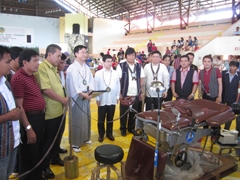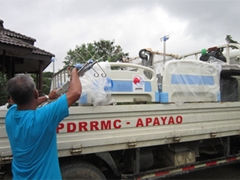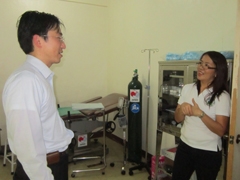- Home
- Technical Cooperation Projects
- Index of Countries
- Asia
- Philippines
- Project for Cordillera-wide Strengthening of the Local Health System for Effective and Efficient Delivery of Maternal and Child Health Services
- Project News
- Project Handed Over Medical and Non-medical Equipment to Different Health Facilities in the Provinces of Abra and Apayao
Project News
2013-03-08
Project Handed Over Medical and Non-medical Equipment to Different Health Facilities in the Provinces of Abra and Apayao
 Hand-over ceremony in the Province of Apayao
Hand-over ceremony in the Province of Apayao
In December 2012, the Project handed over a some sets of birthing equipment and other birthing delivery apparatus to the local officials of the provinces of Abra and Apayao in the Cordillera Administrative Region. The end-users are, 3 RHUs and 6 hospitals of Apayao and 6 RHUs and 2 Hospitals in Abra. Included in the turned-over equipment are delivery tables, examination tables, recovery beds, fatal doppler, diesel generator sets and other tools needed to ensure safe delivery.
The ceremonial turn-over was held on January 24, 2013 in Apayao. Officials from the Embassy of Japan and JICA headed by the Minister of Economic Affairs Akio Isomata, together with Under Secretary of the Department of Health, Dr. Gerardo Bayugo were welcomed by the constituents of Apayao Province headed by Governor Elias Bulut Jr. at the gymnasium in Luna Municipality.
In Apayao, 45 percent of mothers still prefer to give birth at home. This is largely attributed to a mothers' preference to give birth at home attended only by a family member or traditional birth attendants. Poverty and the region's terrain prevent mothers from availing themselves of the services of hospitals or birthing clinics. Besides practicing the home based delivery provides comfort to the mother who is giving birth. However, in the clinical perspective, home based delivery may increase a mother and child's susceptibility to infection, and may also delay detection of emergency situations and prompt treatment actions. In the clinical perspective, the best way to reduce high maternal and child mortality rate is to raise the awareness of pregnant mothers to seek regular check-up and deliver in a health facility attended by health professionals to detect early any emergency situation and pregnancy complications.
Aside from provision of equipment, the Project also assists the continuous training of members of BEmONC (Basic Emergency Obstetric and Newborn Care) in RHUs and hospitals. The Project expects that with more equipped facilities and trained health personnel there will be improvement in the quality of delivery services and will contribute to the reduction of maternal and infant mortality in this region.
The Project will be implemented for 4 years, and plans to also provide equipment to Barangay Health Stations and training for the midwives in its 2nd project year (2013) to further enhance the delivery services capability in the health facilities and make it more accessible for the remote communities.
 Delivery truck goes to the far-flung communities to deliver the equipment
Delivery truck goes to the far-flung communities to deliver the equipment
 Equipment all set up, serving mothers. (Lagangilan RHU, Abra)
Equipment all set up, serving mothers. (Lagangilan RHU, Abra)
- About JICA
- News & Features
- Countries & Regions
- Our Work
- Thematic Issues
- Types of Assistance
- Partnerships with Other Development Partners
- Climate Change / Environmental and Social Considerations
- Evaluations
- Compliance and Anti-corruption
- Science and Technology Cooperation on Global Issues
- Research
- JICA Development Studies Program / JICA Chair
- Support for the Acceptance of Foreign HRs / Multicultural and Inclusive Community
- Publications
- Investor Relations
